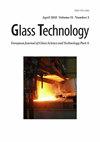Ethical Climate: Analyzing the Moderation Effect on Cardinal Virtues and Employees’ Cyber Security Ethical Behavior Intention in Ugandan Commercial Banks.
IF 0.3
4区 材料科学
Q4 MATERIALS SCIENCE, CERAMICS
Glass Technology-European Journal of Glass Science and Technology Part a
Pub Date : 2022-07-06
DOI:10.47672/ejt.1112
引用次数: 0
Abstract
Purpose: Ethics is the last issue that organizations ponder about when planning cyber security strategies. Yet Ethical behaviors have a big impact on the interactions with software and technology. The lack of employees’ cyber security ethical behavior and a weak ethical climate have encouraged security violations in the banks. Employees organize over 90% cyber security breaches and even cooperate with external attackers to cause havoc. This research aimed at understanding the moderation effect of Ethical Climate on the influence of the ethical virtues and cyber security ethical behavior in the central Ugandan commercial banks. Methodology: Ethical climate theory provided the conceptual framework for this study. The quantitative survey method utilizing an online questionnaire was used. Data was obtained from a sample of 240 commercial banks’ employees drawn from Centenary and ABSA banks’ branches in central Uganda. Partial Least Squares Structural Equation Modeling was used to test for casual relations between the study’s constructs. The data was analyzed and the hypothesis tested using Mod graphs. Findings: The results reveal that ethical climate effect on temperance, courage, prudence and justice was positive but insignificant. All the lines of the mod graphs were parallel meaning that the slope and the influence of cardinal virtues on cyber security ethical behavior intention is the same at all levels of the ethical climate. Inferring that Ethical climate does not moderate the influence of cardinal virtues and cyber security ethical behavior. Ethical Climate on the other hand had a positive and significant influence on cyber security ethical behavior. An increase in ethical climate positively influences an increase in cyber security ethical behavior. Contribution to theory and Practice: This research makes a theoretical contribution in promoting ethical climate as a theory that has a positive effect on employees’ cyber security ethical behavior. The research further provides a significant understanding to Ugandan banks administrators, policy makers and cyber security policy implementation committees of the substantial positive influence of Ethical Climate on connection between Virtue ethics and employees’ cyber security ethical behavior. Recommendation: The study recommends that the banks need to establish strong ethical climate to allow employees to continue observing cyber security ethical conduct. When the ethical climate is strong, employees experience a lesser amount of force to breach the banks’ cyber security.道德氛围:乌干达商业银行基本美德与员工网络安全道德行为意愿的调节效应分析
目的:道德是组织在规划网络安全策略时考虑的最后一个问题。然而,道德行为对与软件和技术的互动有很大的影响。员工网络安全道德行为的缺失和道德氛围的淡薄,助长了银行的安全违规行为。员工组织了超过90%的网络安全漏洞,甚至与外部攻击者合作造成破坏。本研究旨在了解伦理气候对乌干达中部商业银行伦理美德和网络安全伦理行为影响的调节作用。方法:伦理气候理论为本研究提供了概念框架。采用在线问卷的定量调查方法。数据是从乌干达中部的Centenary和ABSA银行分支机构抽取的240名商业银行员工样本中获得的。偏最小二乘结构方程模型用于检验研究构念之间的因果关系。使用Mod图对数据进行分析,并对假设进行检验。结果发现:道德氛围对节制、勇气、谨慎和正义的影响为正,但不显著。模型图的所有线条都是平行的,这意味着在道德气候的各个层次上,基本美德对网络安全伦理行为意愿的斜率和影响是相同的。推断伦理氛围对基本美德和网络安全伦理行为的影响没有调节作用。伦理氛围对网络安全伦理行为有显著的正向影响。道德氛围的增加积极影响网络安全道德行为的增加。理论与实践贡献:本研究为推动道德氛围理论对员工网络安全道德行为产生积极影响做出了理论贡献。该研究进一步为乌干达银行管理者、政策制定者和网络安全政策执行委员会提供了重要的理解,道德气候对美德伦理与员工网络安全道德行为之间的联系产生了实质性的积极影响。建议:该研究建议,银行需要建立强大的道德氛围,让员工继续遵守网络安全道德行为。当道德氛围浓厚时,员工破坏银行网络安全的压力较小。
本文章由计算机程序翻译,如有差异,请以英文原文为准。
求助全文
约1分钟内获得全文
求助全文
来源期刊
CiteScore
0.30
自引率
0.00%
发文量
0
审稿时长
>12 weeks
期刊介绍:
The Journal of the Society of Glass Technology was published between 1917 and 1959. There were four or six issues per year depending on economic circumstances of the Society and the country. Each issue contains Proceedings, Transactions, Abstracts, News and Reviews, and Advertisements, all thesesections were numbered separately. The bound volumes collected these pages into separate sections, dropping the adverts. There is a list of Council members and Officers of the Society and earlier volumes also had lists of personal and company members.
JSGT was divided into Part A Glass Technology and Part B Physics and Chemistry of Glasses in 1960.

 求助内容:
求助内容: 应助结果提醒方式:
应助结果提醒方式:


